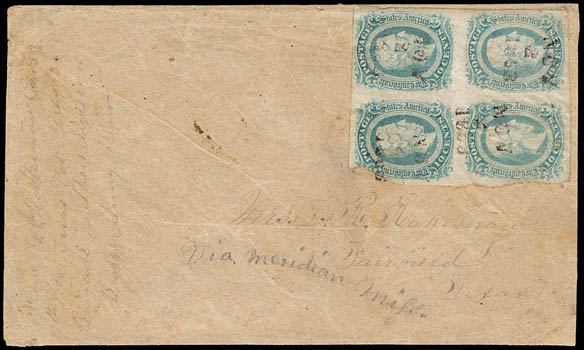
Lot
523 
Confederacy, 1863 Blockade Run Usage From England to Milton, N.C. via Charleston, S.C., "Charleston S.C., Mar. 17, 1863" double circle postmark and matching "Steam-Ship" oval handstamp on inbound cover from Lt. W. L. Maury in England to Mrs. Maury in Milton N.C., manuscript "Ship" endorsement and pencil "12" rate (10¢ plus 2¢ ship fee); slightly trimmed across top & small repair at lower right corner, portion of original top back flap reattached, Very Fine, ex-Seacrest, Walske; with 2004 C.S.A. certificate. Estimate $1,500 - 2,000.
Carried by the blockade-runner "Ruby", leaving Nassau Mar. 13, 1863 and arriving in Charleston on Mar. 17. The "Ruby" made 8 successful trips, but ultimately was destroyed off Charleston Jun. 11, 1863.
Lieutenant William L. Maury was commander of the "C.S.S. Georgia", a cruiser in the North and South Atlantic, capturing nine United States' merchant vessels. She put into Cherbourg, France, in late October 1863 with her iron hull badly fouled by marine growth and was decommissioned as being unsuited for further use as a warship.
Realized: $2,200

Lot
524 
Confederacy, (Trans-Mississippi) - Army of Tennessee, "Nov. 2, 1863" Date Handstamp, "Chicamauga" Field Cancel tying 10¢ blue (11) block of 4, small corner nick at top left, right pair with small fault, on Trans-Mississippi cover to Fairfield, Texas with pencil manuscript "via Meriden, Miss." routing instruction and soldier endorsement at left; cover with small corner repair at bottom right, Very Fine, ex-Solomon; with clear 1982 C.S.A. certificate. Estimate $7,500 - 10,000.
ONE OF THE MOST IMPORTANT TRANS-MISSISSIPPI COVERS IN EXISTENCE. THE COMBINATION OF A BLOCK OF 4 PAYING THE 40¢ RATE TIED BY THE ARMY OF TENNESSEE DATE HANDSTAMP ON A TRANS-MISSISSIPPI COVER IS A UNIQUE USAGE.
The Mississippi River and inland waterway routes were essential lifelines within the Confederacy. Early in the war, Federal naval strategy focused on control of the Mississippi, and, by the spring of 1862, key port cities were captured by Federal forces, giving them control of the river. With the Southern states divided between East and West, the Confederate government was forced to devise special measures to maintain transportation and communication along the trans-Mississippi routes. Surreptitious traffic across the river was carried on by private and government couriers, and the post office was authorized to appoint agents to ensure that the mail lines remained open. In April 1863 the Confederate Congress authorized a "preferred mail" across the Mississippi River and established a 50¢ rate per half-ounce. The act was revised to create an "express mail" without a fixed rate of postage, but instead limited to no more than a dollar per half ounce. By October 1863, Postmaster General Reagan secured a contract to have mail carried across the Mississippi at the rate of 40¢ per half ounce. Meridian and Brandon, Mississippi, were chosen as the eastern terminal points. Shreveport and Alexandria, Louisiana, were chosen as the western terminal points.
